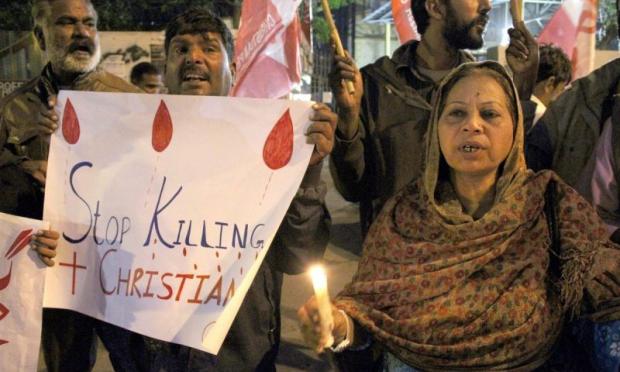Pakistan’s obsession with Blasphemy Laws Blasphemy is a highly sensitive issue in deeply conservative Pakistan where mere allegations have led to extrajudicial killings and mob violence. Human rights campaigners have long sought the repeal of draconian blasphemy laws, arguing they are used to victimize religious minorities or settle personal scores. In February 2021, Centre for Social Justice (CSJ), an NGO based out of Lahore, Pakistan, released data that showed the abuse of blasphemy laws had increased exponentially in Pakistan. In its press release, the advocacy group noted:
From 1987 to December 2020, at least 1,855 persons have been alleged under the offences related to religion, mostly under Sections 295B, C to 298C, of the Pakistan Penal Code known as Blasphemy laws. Christians, with a population of around 2.8 million in Pakistan, are one of the largest religious minority groups in Pakistan. History is witness to the fact that Christian community has born the major brunt when it comes to misuse of Blasphemy laws by Pakistan authorities. Open Doors USA, a California based non-profit organization, in its 2021 World Watch List, ranked Pakistan the world’s fifth-worst persecutor of Christians. In 1997, the twin villages of Shantinagar-Tibba colony under Multan Division, were looted and burnt by 20,000 Muslim citizens and 500 policemen acting together after an incident of desecration of the Quran was reported. The police had first evacuated the Christian population of 15,000, and then helped the raiders use explosives to blow up their houses and property.
Several incidents of arson and loot of Christian properties have been reported ever since. In 2005, a mob of 3,000 led by a local politician and the police burnt down three churches, a missionary run-school, two hostels and several houses belonging to Christians in Sangla Hill in Nankana district in Punjab. The false allegations of blasphemy are often rooted into personal grudges, conflicts in workplaces and in communities. This was evident when on April 10, 2021, two Christian nurses identified as Mariam Lal (staff nurse) and Neush Arooj (student) were charged for violating blasphemy law. A coworker head nurse Rukhsana alleged that nurses damaged the Islamic religious sticker which was hung on the cupboard. The nurses were attacked with knife but police, instead of arresting the attacker, arrested the nurses under section 295-B of the Pakistan Penal Code on the complaint of Dr. Muhammad Ali. In February 2021, two Christian evangelists Haroon Ayub Masih and Salamat Mansha were arrested on charges of making derogatory remarks against Islam, the Quran, and offending religious sentiments of a Muslim while preaching in Lahore. They were charged with violating blasphemy laws and face death sentence. Anjum James Paul, Chairperson of the Pakistan Minorities Teachers’ Association, while condemning the arrests claimed, “Article 20 of Pakistan’s
Constitution guarantees freedom to every citizen to profess, practise and propagate his religion. It is discrimination to stop propagation of one specific religion. We demand our right of religious freedom as equal citizens”. Recently, a board member of ACAT (the Action of Christians for the Abolition of Torture), a Belgium based organization working for the betterment of Christians worldwide, wrote a letter to Pakistan PM Imran Khan drawing attention to the case of Shafqat Emmanuel and Shagufta Kausar, a Christian couple convicted of “blasphemy” and sentenced to death in 2014 for allegedly sending “blasphemous’’ text messages to the imam of a mosque.
Shafqat Emmanuel and Shagufta Kausar have rejected all charges against them and are waiting for their appeal against their conviction to be heard by the Lahore High Court. The activist urged the Pakistan Prime Minister to ensure that Shafqat Emmanuel and Shagufta Kausar are released immediately and unconditionally, and that they and their lawyers are accorded adequate protection upon their release.
According to the October 2019 report of the United States Commission on International Religious Freedom, at least 80 people have been convicted of blasphemy in Pakistan and many of them face death penalty. In December 2020, the U.S. House of Representatives passed a resolution calling the worldwide repeal of blasphemy, heresy and apostasy laws, some of which have resulted in the imprisonment and/or deaths of Christians accused of speaking against Islam. Pakistan’s blasphemy laws, both in content and application, are contrary to Pakistan’s human rights obligations to respect and protect the right to life, freedom of thought, conscience and religion or belief, freedom of opinion and expression, equality before the law, prohibition of discrimination and the right to life. These blasphemy laws violate Article 6(1) of the International covenant on Civil and Political Rights that states that the automatic and mandatory death penalty constitutes an arbitrary deprivation of life. Therefore, these laws do not comply with human rights law and standards, nor do they contain basic safeguards to limit the risk of further human rights violations and abuses, and are emblematic of the dangers faced by religious minorities in the country.

Κόσμος
Ενημερώθηκε στις:
Pakistan’s obsession with Blasphemy

Ακολουθήστε το Πενταπόσταγμα στο Google news













